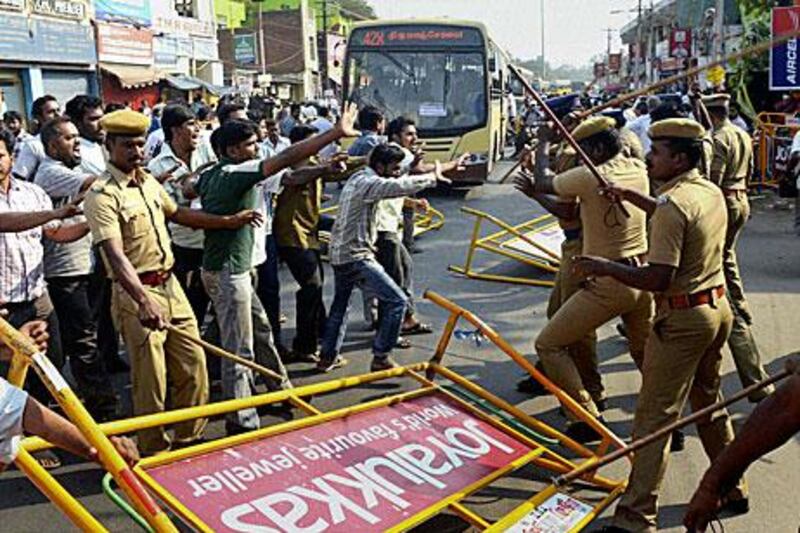NEW DELHI // A spy thriller about a Kathak dancer foiling a terrorist attack on New York has set off a fierce free-speech debate, hectic court cases, and a rift between the central government and the state of Tamil Nadu.
The release of Vishwaroopam, a 1.2-billion-rupee (Dh83m) film starring one of the biggest names in Tamil cinema, Kamal Haasan, was blocked last week by the state government after Muslim groups protested that it portrayed Muslims in poor light.
"There is a danger that the public may view any Muslim with a beard as a terrorist waiting for an opportunity to plant a bomb," said M H Jawahirullah of the Tamil Nadu Muslim Munnetra Kazhagam, one of the groups objecting to the film.
J Jayalalithaa, the chief minister of Tamil Nadu, said at a press conference yesterday that "there were apprehensions that Muslim demonstrations could turn violent ... Should I have allowed violence and then stepped in?"
In the past week, the film's release has been banned in the United Arab Emirates, Sri Lanka and Singapore. Vishwaroopam continues to play in Tamil Nadu's neighbouring states without any mishap, although the producers have added a disclaimer to the credits: "All Muslims are not terrorists, and the characters depicted in this film are imaginary."
The plot of Vishwaroopam revolves around an Afghanistan-based terrorist group that is planning a dirty bomb attack on New York, and the hero's attempts to thwart that attack.
"There's a montage of these terrorists being trained in Afghanistan, but this has nothing to do with Indian Muslims," said TK Balaji, a Chennai-based entrepreneur who made a six-hour bus journey to Bangalore in the neighbouring state of Karnataka yesterday to watch the film.
On Tuesday night, a high court judge, acting on a petition by Haasan, set aside the government's ban. But on Wednesday morning, a high court bench that included Tamil Nadu's chief justice reversed the decision, even as police moved to block screenings of the film.
In an emotional 10-minute press conference on Wednesday outside his house in Chennai, Haasan – a Hindu but given a Muslim-sounding name by his profoundly secular father – said that he was "fed up".
"When M?F Husain can do it, Kamal Haasan can do it," he said, referring to the late Indian painter who was hounded out of the country by right-wing Hindu groups for his controversial depictions of Hindu goddesses. "I will have to seek a secular state for my stay ... Tamil Nadu wants me out."
Haasan, who is credited as the writer, director and producer of the Vishwaroopam, could petition the Supreme Court to lift the ban on the film, but has yet to do so. Yesterday, Ms Jayalalithaa indicated that the ban might be lifted if Haasan and the leaders of Muslim groups agreed jointly to delete objectionable portions of the film.
Sriram V Ayer, the founder and chief executive of NalandaWay Foundation, a Chennai-based non-profit that works with disadvantaged children, has pledged to not watch any film in his city's theatres until "justice is done".
He has started a Facebook group to get others to join his boycott to which more than 500 people have signed up.
"There is a growing tendency for mobs and fringe groups to take offence on any artistic expression and the state stooping to appease them in the guise of law and order," Mr Ayer said. "It is a very sad state of affairs."
The free-speech controversy over Vishwaroopam has exploded on to the national stage, with the central government – of which Ms Jayalalithaa's rival political party, the Dravida Munnetra Kazhagam, is a part – implicitly supporting Haasan. On Wednesday, the home minister Sushil Kumar Shinde said: "We are a free society. There is freedom of expression. There is liberty for artists."
But Ms Jayalalithaa argued that her state's police force was inadequately equipped to guarantee security at each of Tamil Nadu's 500-odd cinemas.
"If the strength of the Tamil Nadu police would have been put on these theatres, what would we do about their regular duties?" she said.
Nikhil Mehra, a New Delhi-based Supreme Court lawyer, said Ms Jayalalithaa's ban on the film was "flawed from the start".
"There have been Supreme Court judgments saying that if there is an apprehension of a law and order problem, the state government has to handle the problem and protect free speech," Mr Mehra said. "According to the theory of precedent, the high court cannot be upholding the ban in the face of Supreme Court judgments."
"What is the role of the censor board, then?" Mr Mehra added. "There's a certain amount of confusion in all of this. It's important for Kamal Haasan to go to the Supreme Court, because this process has become rubbish now."
Ironically, in a landmark Supreme Court judgment, it was another Tamil film that was granted explicit judicial support of a filmmaker's right to free speech.
In 1989, the movie Ore Oru Gramathile (In A Village) had criticised caste-based affirmative action. After a political party threatened that its demonstrators "would not hesitate to damage the cinema", the Tamil Nadu government blocked its release.
The Supreme Court, however, directed the film to be released, stating: "The state cannot plead its inability to handle the hostile audience problem. It is its obligatory duty to prevent it and protect the freedom of expression."
ssubramanian@thenational.ae
twitter: For breaking news from the Gulf, the Middle East and around the globe follow The National World. Follow us





